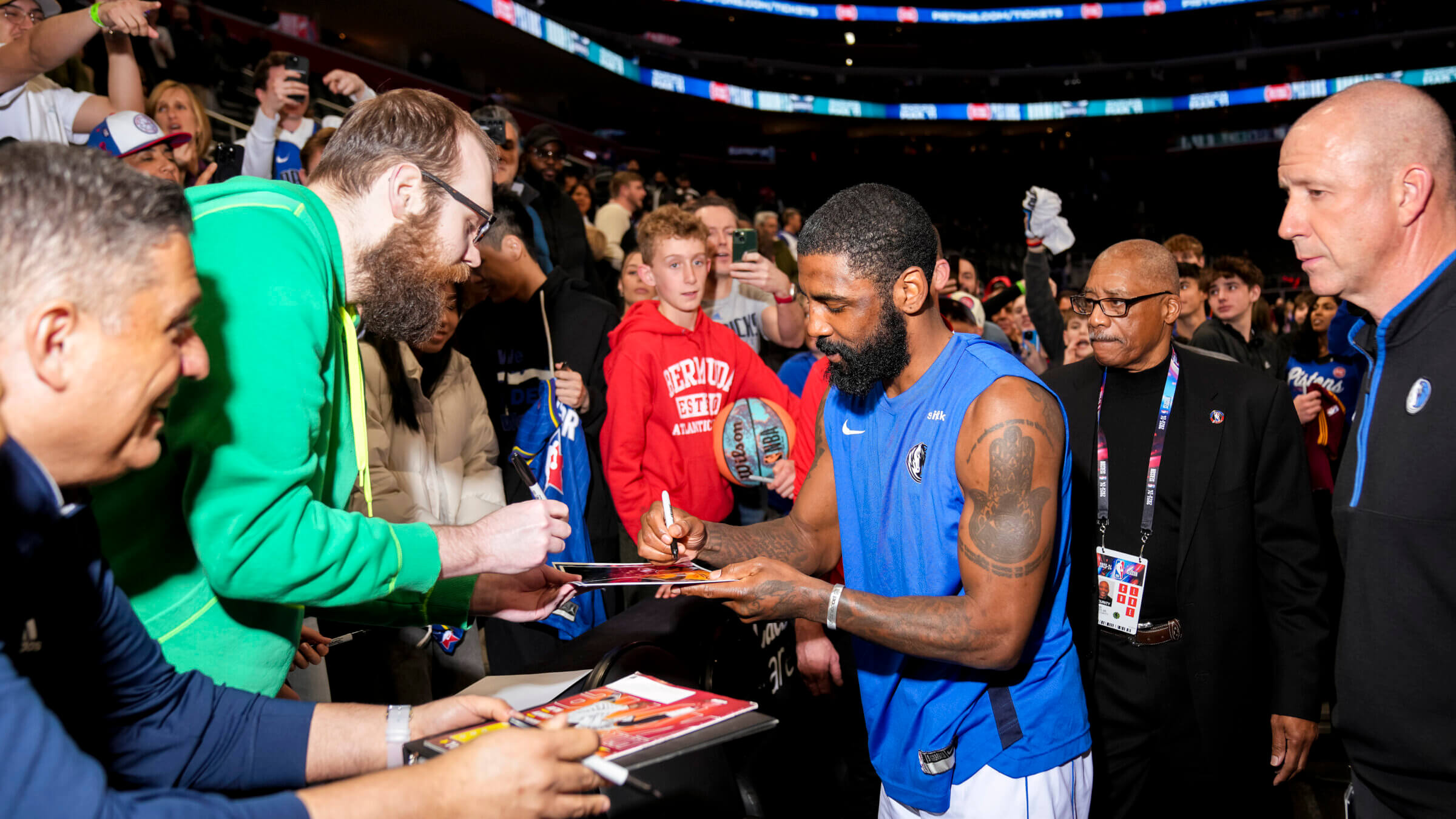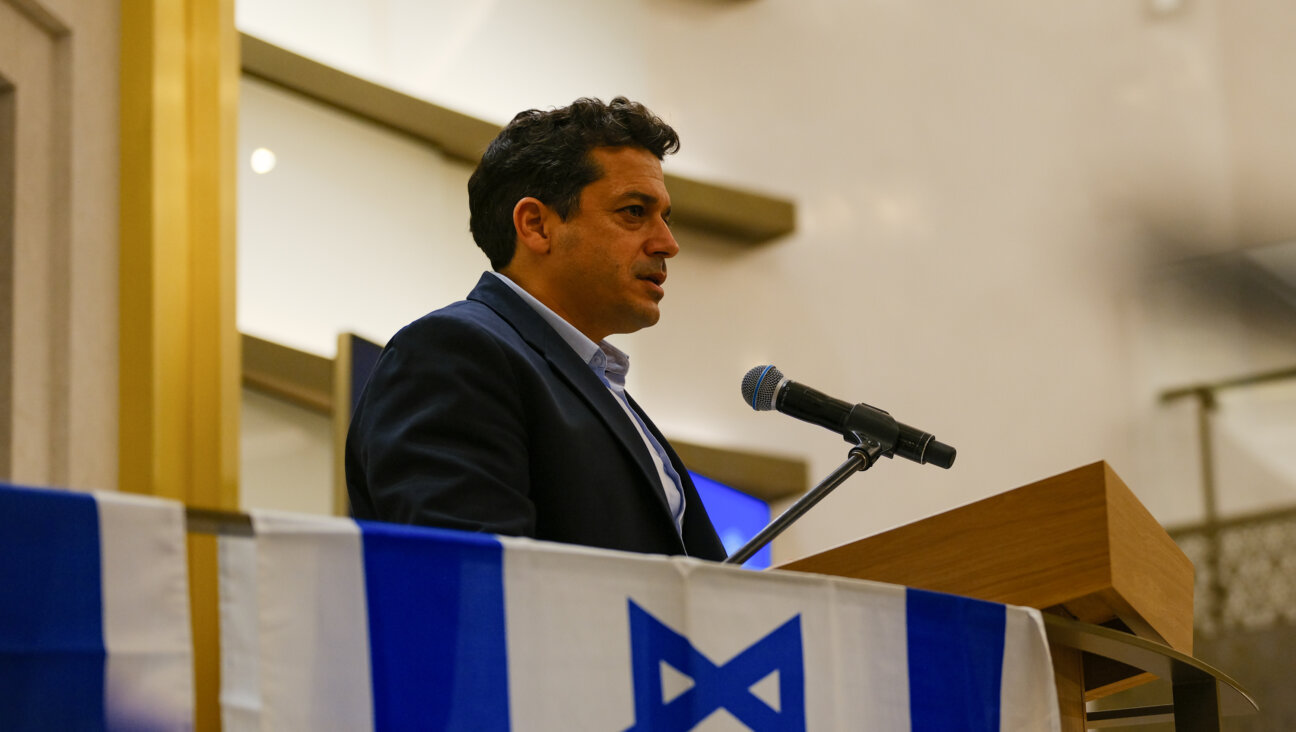How Kyrie Irving’s antisemitism scandal vanished
The Kyrie Irving saga shows how selective the organized Jewish world can be when it comes to calling out antisemitism

Kyrie Irving signs autographs for fans following a game this spring. The basketball star’s promotion of a documentary that described the Holocaust as a lie seems to have faded from memory. Photo by Getty Images
“Antisemitism Notebook” is a weekly email newsletter from the Forward, sign-up here to receive the full newsletter in your inbox each Thursday
How many of you remember when one of the NBA’s most famous players shared a documentary claiming that Jews had fooled the world into believing that they were God’s chosen people, including by fabricating the Holocaust?
Kyrie Irving’s promotion of “Hebrews to Negroes” came around the same time as antisemitic outbursts by Ye, the rapper formerly known as Kanye West, and caused only a relatively brief outcry.
Irving alternately played coy — saying that sharing the link didn’t constitute promoting it — and inflamed tensions, denying that he could be antisemitic by hinting that, as the movie suggested, Africans were the real Jews.
He was suspended, donated to the Anti-Defamation League, made more inflammatory comments, saw his donation get rejected, eventually apologized and returned to the court and then months later deleted the social media post containing his apology after being traded from the Brooklyn Nets to Dallas.
Now he’s leading the Mavericks on a playoff run and concerns about his alleged antisemitism have all but disappeared.
“It doesn’t come up unless Kyrie Irving does something good,” explained my colleague Louis Keene, who covered the original controversy. When that happens, Irving’s legions of young fans will bemoan the past efforts to cancel him.
Louis just published a piece about his conversations with Jewish Mavericks fans who, whether they like him personally or not, are rooting for Irving to succeed. “I’ve forgotten about the antisemitism,” said Ben Calmenson, a 28-year-old who grimaced when Iriving wore a keffiyeh to a recent press conference but quickly excused it.
I still cringe when I watch Irving win, as he’s been doing throughout the playoffs and did again against the Minnesota Timberwolves Wednesday night. But I’m not saying he should have been kicked out of the league for sharing a film that concludes Jews are to blame for Black suffering. He mostly seems like a weird guy who doesn’t believe in vaccines and isn’t sure whether the earth is flat or round.
“There’s a lot of young fans who see Kyrie Irving as an iconoclastic figure whose vulnerability to conspiracy theories is just part of that,” Louis explained to me. “He’s very charitable — even by the standards of professional athletes — and he’s very outspoken on social issues, so they just see him as a genuinely and deeply good person who is a little bit unusual.”

The Kyrie Irving saga shows how selective the organized Jewish world can be when it comes to calling out antisemitism. The American Jewish Committee and other leading groups quickly aborted a campaign to convince Amazon, which still sells the antisemitic film on its Prime Video service, to remove the movie after Andy Jassy, the company’s chief executive, refused.
Right now, the concern is about what’s happening with left-wing students on elite college campuses. But if Irving was playing basketball thirty years ago, when Jewish groups were focused on how so-called “Black antisemitism” threatened American Jews, it is possible reporters wouldn’t have so quickly stopped asking him about “Hebrews to Negroes” and his social media post referring to Israelis as “murderous oppressors” would have received more attention.
There’s also the fact that Irving is playing for a basketball team that Mark Cuban, who Louis described as a “Jewish community legend,” is in the process of selling to Miriam Adelson, wife of the late Jewish casino mogul and philanthropist Sheldon Adelson.
And Irving is a celebrity. Jewish leaders have a fair amount of sway on campus and even in Congress. But it’s really, really hard to sanction superstars for what fundamentally amounts to intemperate comments. “They recognized their power is kind of limited,” Louis said.

















